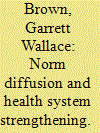|
|
|
Sort Order |
|
|
|
Items / Page
|
|
|
|
|
|
|
| Srl | Item |
| 1 |
ID:
105158


|
|
|
|
|
| Publication |
2011.
|
| Summary/Abstract |
The word' partnership' is pervasive within debates about participatory global governance and the idea of partnership acts as an underwriting principle within both the Millennium Development Goals (MDGs) and the Paris Declaration. However, there remains general ambiguity about the meaning of the idea of partnership and how its conceptualisation is meant to normatively guide a more co-ordinated move from theory to practice. Indeed, the idea of partnership remains an impoverished theoretical and practical appeal, which is under-defined, poorly scrutinised and unconvincingly utilised as a normative tool in applied practice. This article will provide a more theoretical examination of what an appeal to ideas of partnership means and explore what a normative commitment to a robust conceptualisation of partnership might look like within the MDGs. To do so, it will examine the underwriting normative language of partnership as it is found within the MDGs, theoretically explore the principles inherent within this normative language, and locate present gaps within the MDGs between its normative theory and applied practice. By doing so, it will be possible to outline some additional principles and commitments that are normatively required to satisfy the underwriting spirit of the MDGs in order to bring them in line with said spirit's own normative values.
|
|
|
|
|
|
|
|
|
|
|
|
|
|
|
|
| 2 |
ID:
088076


|
|
|
|
|
| Publication |
2009.
|
| Summary/Abstract |
During the past ten years there has been an increased willingness by international
health organizations to include multisectoral nonstate actors
in their decisionmaking processes. The stated aim of expanding multisectoral
involvement is to increase information flows from those on the ground,
to create a sense of policy ownership by those implementing various health programs,
to create a more unified front against global health priorities, and to
create a more robust sense of institutional legitimacy. One such institution has
been the Global Fund to Fight AIDS, Tuberculosis and Malaria, which was designed
specifically to bring various stakeholders together to create a more coordinated
mechanism to combat three of the world's most destructive diseases.
The purpose of this essay is to discuss the role of nonstate actors in the
decisionmaking processes of the Global Fund. The aim of this discussion is
not to undermine the good work of the Global Fund, but to expose certain
structural weaknesses in the current way nonstate actors are incorporated into
the governance process and to illustrate how these structural processes might
negate their effective participation. By doing so, this exploration will help expose
various deficit gaps between the stated aims of multisectoral participation
within the Global Fund and its actual practice. The goal is to encourage normative
recommendations for increasing the real-world operation of stakeholder
inclusiveness, ownership, partnership, and participation within the Global Fund.
|
|
|
|
|
|
|
|
|
|
|
|
|
|
|
|
| 3 |
ID:
141061


|
|
|
|
|
| Summary/Abstract |
Academics and policymakers often argue that global health policy greatly affects and influences national health systems because these policies transfer and implant ‘best practice’ norms and accountability techniques into local health systems. On the whole these arguments about the ‘diffusion of norms’ have merit since there is considerable evidence to suggest the existence of a positive correlation between global norms and national behaviour. Nevertheless, this article argues that traditional analytical frameworks to explain norm diffusion underplay the fact that norms are significantly ‘glocalised’ by national actors and further discount the role that national leadership plays in strengthening health systems. In response, this article presents a ten-year comparative paired study of the participatory governance mechanisms of the South African health system and its health strengthening measures. In doing so, the role of the national government in their relations with the Global Fund to Fight AIDS, Tuberculosis, and Malaria (GFATM) will be examined and how key ‘partnership’ norms were amalgamated into health governance mechanisms. It will be argued that although global policy plays an important guiding role, health norms are never transcribed straightforwardly and a central element to successful health governance remains vested in the nation and the leadership role it exerts.
|
|
|
|
|
|
|
|
|
|
|
|
|
|
|
|
| 4 |
ID:
095620


|
|
|
|
|
| Publication |
2010.
|
| Summary/Abstract |
It is often argued that multilateralism is no longer an effective mechanism to respond to global priorities and that more deliberative and multisectoral governance is needed. To explore this, the purpose of this article is to examine the practice of mutlisectoral deliberation within the Global Fund to Fight AIDS, Tuberculosis and Malaria and to determine whether it has resulted in providing a more deliberative response to global health priorities. To do so, this article will apply various theoretical arguments for deliberative democracy to the results of a four year study on the multisectoral organisation the Global Fund. By making links between theory and practice, the article will argue that the multisectoralism practiced by the Global Fund continues to suffer from a deliberative deficit and that it has not safeguarded equal stakeholder participation, equal deliberation between stakeholders or alleviate the asymmetric power relationships which are representative of current forms of multilateral governance. Nevertheless, by locating these gaps between theory and practice, it is possible to outline deliberative safeguards that might, if constitutionally enhanced, pull the Global Fund closer to its own normative values of multisectoral deliberative decision-making.
|
|
|
|
|
|
|
|
|
|
|
|
|
|
|
|
| 5 |
ID:
067214


|
|
|
|
|
|
|
|